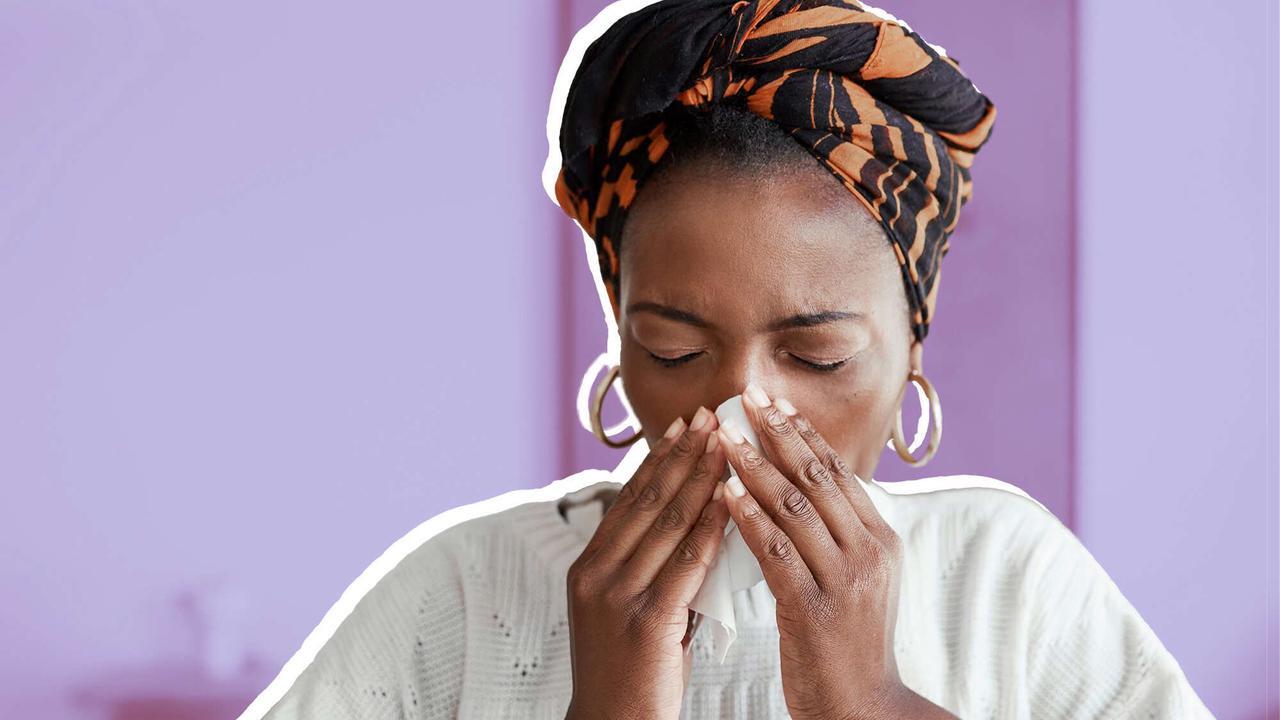Runny Nose Causes, Treatments, and Prevention

Odds are you've had a runny nose at some point in your life. That means you know how annoying it can be, forcing you to have a tissue within close reach at all times.
Because they're a nuisance to deal with, once one develops, you probably want to know why you have a runny nose in the first place, how you can get rid of it, and what you can do to prevent it from happening in the future. Here's a breakdown of everything you need to know about a runny nose, including when you should go to the doctor.
What is a runny nose, exactly?
The phrase "runny nose" is used to describe excess nasal drainage, per the Mayo Clinic. The thin, usually clear discharge is called rhinorrhea. But "consistency can vary, and the discharge is sometimes a thicker mucus," Anthony LaCava, MD, a fellow of allergy and immunology at Penn Medicine, tells Health.
Keep in mind that you might not just be dealing with mucus dripping out of your nose. "Not only can excess mucus drain from the nose, it can also drain down the back of the throat," Sophia Tolliver, MD, MPH, clinical assistant professor of family medicine at The Ohio State University Wexner Medical Center, tells Health. This, she points out, is called post-nasal drip and can happen at the same time as a runny nose.
A runny nose "usually occurs as a result of rhinitis, which is inflammation of the nasal tissues," George Scangas, MD, an otolaryngologist at Mass Eye and Ear, tells Health, adding that there are a slew of things that can lead to rhinitis—from temperature changes to certain infections.
The most common causes of a runny nose
The causes of a runny nose range from the no-big-deal to the more serious. While there's a massive list of potential issues, experts say these are some of the more common causes of a runny nose:
Temperature
Your nose helps to filter, humidify, and warm the air that gets into your lungs, the Cleveland Clinic explains. That happens through a system that includes your mucosa, or moist tissue that lines the inside of your nose; mucus, which traps bacteria and viruses; and cilia, which are tiny hairs that move trapped particles and mucus to the back of your throat. When it's cold out, this whole process slows down. As a result, mucus can hang out in your nose for longer than usual and then drip out.
Common viral infections
You might get a runny nose if a virus enters your body and leads to an illness, including:
Common cold: A runny nose is a hallmark symptom of the common cold. "It's usually caused by a viral infection of the mucus membranes of the nose and throat," Dr. Tolliver says. Your nose essentially tries to fight off the germs by increasing mucus production, which then can drip out of your nose.
Flu: Similar to a common cold, your nasal tissues become irritated when you have the flu and can lead to a runny nose, Dr. Scangas says.
RSV: A respiratory syncytial virus infection (aka, RSV) can also cause a similar reaction as the common cold and flu, Dr. Scangas says: Your nasal tissues become irritated and produce more mucus to try to get rid of the infection.
Allergies
Your body's response to allergies can be pretty similar to how it reacts when you have a cold or other infection—it makes more mucus to try to get rid of the invader. In this situation, the invader is an allergen. "Environmental allergies can cause nasal inflammation that often results in a runny nose, sneezing, and nasal congestion," Dr. LaCava says.
"In the case of allergies, our immune system is triggered to send immune cells to wherever the allergen is," Dr. Scangas explains. "This increases the blood flow to that area and causes nasal congestion and extra mucus production."
Sinusitis
Sinusitis (aka, a sinus infection) is an inflammation or swelling of the tissue that lines your sinuses, per the Mayo Clinic. This interferes with your mucus drainage and causes it to build up. The discharge that comes with sinusitis is usually thick, yellow or greenish mucus.
COVID-19
The Centers for Disease Control and Prevention lists runny nose as one of the main symptoms of COVID-19, a disease caused by the SARS-CoV-2 virus. The symptom can happen because your "immune system fights back to attempt to prevent the infection from entering the body," Dr. Scangas says.
Overuse of nasal spray decongestants
Nasal spray decongestants can help relieve stuffiness, but using them too much can cause what's known as a rebound effect, where they actually make your symptoms worse, Dr. Tolliver says.
"Nasal decongestants help to shrink or constrict blood vessels in the nose which helps to decrease the sensation of nasal congestion," she explains. "As the vessels shrink, blood and nutrients are squeezed out."
But once the medication wears off, a rush of blood and nutrients returns, which leads to more congestion and runny nose symptoms.
Cerebrospinal fluid leak
Technically, this doesn't happen often, but it's a good idea to have it on your radar as a just-in-case since there can be complications if not treated. Cerebrospinal fluid (CSF) is the cushion that surrounds your brain and spinal cord to protect them from injury, per the Mayo Clinic. In rare situations, CSF can leak in either the spinal column or the skull. A runny nose can be a symptom of the latter, a cranial CSF leak. That typically involves a watery-looking discharge that usually comes out of one nostril as well as a metallic taste in the back of your throat, Dr. Tolliver says. But again, these leaks are rare.
How to treat a runny nose
Exact treatment for a runny nose ultimately depends on the underlying cause, Dr. LaCava says. But sometimes a runny nose just has to run its course. "In general, a runny nose will stop on its own and does not need treatment," Dr. Tolliver says.
If you want to do something to try to feel better until things clear up, you can try these tricks:
Try OTC nasal steroids. These can be helpful if you suspect or know that your runny nose is due to allergies, Isabel Valdez, a physician assistant and assistant professor of general internal medicine at Baylor College of Medicine, tells Health. "Over-the-counter nasal steroids used as directed can help lessen mucus production over time," she explains.
Do a saline rinse. Using a tool like a Neti Pot "can help to flush out mucus and irritants," Dr. Tolliver says.
Drink plenty of water. Staying well-hydrated can help keep your mucus thin, "which will help it drain faster," Dr. Tolliver says.
Use a nasal mist. Spritzing a saline mist into your nose can help moisten your nasal passages and clear out allergens that could be lurking in there, Dr. Tolliver says.
Run a humidifier at night. "Using a cool mist humidifier will help keep nasal passages moist and decrease congestion," Dr. Tolliver says.
How to prevent a runny nose
There are certain runny nose causes, like being out in the cold, that you can only do so much about. But when it comes to things like infections, experts say there are a few ways to prevent a runny nose.
"Preventing a runny nose really comes down to preventing a viral infection or allergen contact," Dr. Tolliver says. She recommends wearing a mask in public indoor spaces, washing your hands often, and making sure you're up to date with your COVID-19 and flu vaccinations. A nice perk: the safety measures of practicing good hand hygiene and masking up that we've picked up during the pandemic can also lower your risk of getting the common cold, flu, and RSV, Dr. Tolliver points out.
If allergies usually cause your runny nose, Valdez suggests using over-the-counter antihistamines or nasal steroid sprays to try to help manage your symptoms before they start.
"It is also important to practice self-care strategies including eating a balanced diet, regularly exercising, and getting adequate rest," Dr. LaCava says. These, he explains, can help keep you and your immune system healthy enough to fight off infections and illnesses that could cause a runny nose.
When to see a doctor about a runny nose
If you develop a runny nose here and there, experts say there's really nothing to worry about. But there are a few different situations where you'd want to seek medical care for a runny nose.
"If a runny nose is discolored—yellow or green—thick, and is accompanied by other symptoms such as headache, facial pressure, or swelling, patients should seek a medical evaluation from their doctor, as this could be a sign of a sinus infection," Dr. Scangas says. If your sinus infection is bacterial, it usually requires treatment with antibiotics for it to fully clear up, Dr. LaCava says.
If your runny nose is severe or keeps on happening despite you treating it, you might also be referred to an ear, nose, and throat specialist for a closer look at your nasal passages to see if you have a chronic sinus issue or nasal polyps, he says.
Again, a spinal fluid leak is rare—and so is cancer inside the nose. But if you have drainage that only seems to be coming from one side of your nose, facial pain, frequent nose bleeds, and changes in vision, or your symptoms seem to be getting worse, Dr. Scangas recommends seeing a doctor to rule out these potential causes.
And if your runny nose has lasted for more than 10 days and it doesn't seem to be getting better, Dr. LaCava suggests checking in with your doctor about next steps.
The post Runny Nose Causes, Treatments, and Prevention appeared first on Health.

